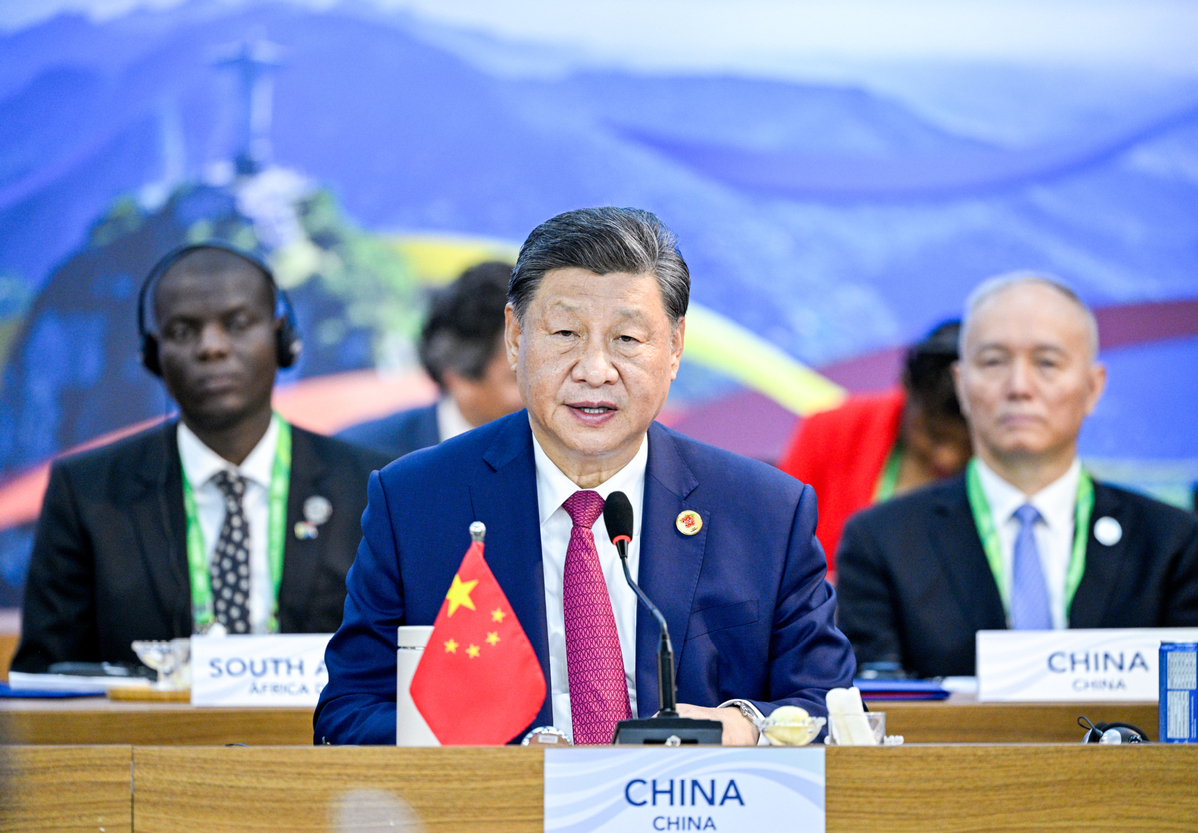
President Xi Jinping delivers a speech, titled "Working Together for a Fair and Equitable Global Governance System", at the second session of the 19th G20 Summit in Rio de Janeiro, Brazil, on Monday. [Photo/Xinhua]
President Xi Jinping's remarks at the 19th G20 Summit in Rio de Janeiro, Brazil, have outlined how to work together for a just and equitable global governance system for the benefit of all, observers said.
Xi's speech was "comprehensive, compact and a clear guide for reform of the prevailing governance system", said Irfan Shahzad Takalvi, founder of the Eurasian Century Institute, a think tank in Islamabad, Pakistan.
It is a resounding message that the "business as usual" approach to global governance serves the purposes and interests of only a few leading nations and ignores the aspirations and genuine rights of the majority of the world's nations and their people, he said.
According to Takalvi, Xi has rightly highlighted that global security governance is part and parcel of global governance, and institutional bodies such as the United Nations Security Council must play their role and take up the responsibility expected of them.
Takalvi said that Xi represented the entire developing world in voicing that it is imperative to reform shareholding and decision-making in leading international financial institutions such as the International Monetary Fund and the World Bank.
"That is how the emerging developing economies of the world can reclaim their lost space in global financial and economic decision-making," Takalvi said.
He noted that Xi once again urged countries to see one another's development as opportunities, not challenges, and to view one another as partners, not rivals.
This spirit can take the world on the way toward the goal of win-win cooperation and shared prosperity, Takalvi said.
Karori Singh, former director and an emeritus fellow of the South Asia Studies Centre at the University of Rajasthan, India, said the G20 Summit sessions focused on pressing global problems such as poverty eradication and the path to global prosperity and stability — central issues of global significance in which technology and climate justice play roles.
"The Chinese president spoke eloquently in both sessions, with clarity and purposefulness," Singh said, noting that Xi outlined China's eight major actions to shore up global development, from high-quality Belt and Road cooperation to high standard opening-up.
Xi's remarks therefore aligned with the message of the United Nations on the eradication of poverty, as people must come together in solidarity of purpose, Singh added.
Sujoko Efferin, a professor on the faculty of business and economics at Universitas Surabaya in Indonesia, said that Xi took a holistic approach to empowering nations economically, with a strong focus on the development of digital technologies, science, entrepreneurship, innovation and barrier-free international trade.
"He underscored the necessity of abandoning the Cold War mentality, which perpetuates an 'us versus them' worldview," he said.
"His arguments are supported by empirical evidence drawn from China's direct experiences in combating poverty," the professor said, adding that the Chinese president "envisions a future economic system centered on green technology and sustainable development. To achieve this vision, he emphasizes the importance of enhanced coordination among G20 nations".
Maarij Farooq, deputy editor-in-chief at Pakistan Economic Net and Daily Ittehad Media Group, said that Xi's remarks at the G20 Summit presented a bold and comprehensive vision for reforming global governance.
Xi underscored China's "steadfast commitment to fostering a fair, inclusive and sustainable international system that addresses the pressing challenges of our time", Farooq said.
"By emphasizing multilateral cooperation, economic inclusivity and sustainable development, President Xi positions China as a key driver of positive change in global governance," he added.
Central to Xi's message is the need for a governance system that reflects the realities of a multipolar world, prioritizing equality, collaboration and mutual respect, he said.
Xi's remarks also reaffirmed China's role as a champion of true multilateralism, a builder of partnerships, and a steadfast advocate for the shared future of humanity, according to Farooq.
Michael Ricafort, chief economist of Rizal Commercial Banking Corp, one of the Philippines' biggest commercial banks, said that China, as the world's second-largest economy, is asserting an increased global role and influence.
He noted that China is contributing to more inclusive economic growth and development, such as helping to alleviate poverty in least-developed countries.





